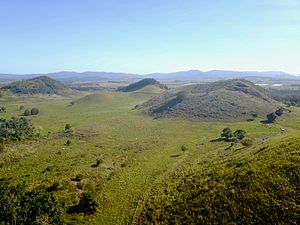The Pinnacles (Atherton Tableland) facts for kids
Quick facts for kids The Pinnacles (Atherton Tableland) |
|
|---|---|
| Seven Sisters | |

Aerial view of The Pinnacles, Atherton Tableland, looking to the southwest
|
|
| Coordinates | 17°16′00″S 145°33′00″E / 17.26667°S 145.55000°E |
| Geology | Cinder cones |
The Pinnacles, also known as the Seven Sisters, are a group of seven small volcanoes. They are found on the Atherton Tableland in Queensland, Australia, close to the town of Yungaburra. These interesting landforms were created over 350,000 years ago!
Contents
What Are Cinder Cones?
The Pinnacles are a type of volcano called cinder cones. Imagine a pile of small, bubbly volcanic rocks. That's pretty much what a cinder cone is!
How Cinder Cones Form
Cinder cones form when a volcano erupts with a lot of gas. This gas blasts out small pieces of lava into the air. These pieces cool quickly and fall back down around the opening, or "vent," of the volcano. Over time, these pieces build up to create a cone-shaped hill.
What Are They Made Of?
The rocks that make up cinder cones are often called scoria. Scoria is a dark, bubbly, and lightweight rock. It's full of tiny holes because of the gas that was trapped inside when it cooled.
How The Pinnacles Were Formed
The Pinnacles didn't just pop up anywhere. They formed in a line that goes from the southwest to the northeast. This suggests that the hot, melted rock (called magma) that came from deep inside the Earth used a crack in the Earth's crust to reach the surface.
Wind and Crater Shapes
Some of the craters (the bowl-shaped openings at the top of the volcanoes) are broken open towards the southeast. Scientists think this happened because strong winds from the southeast blew the ash and scoria. This made the cones build up more on the northwest side.
Surrounding Landscape
Even today, you can see parts of the rocky areas around The Pinnacles. These areas are made of basalt, which is a common type of volcanic rock. Many of these rocky areas are still covered in thick forests. You can even see them near the famous Curtain Fig Tree, which is a huge and ancient tree in the area.
 | Delilah Pierce |
 | Gordon Parks |
 | Augusta Savage |
 | Charles Ethan Porter |


